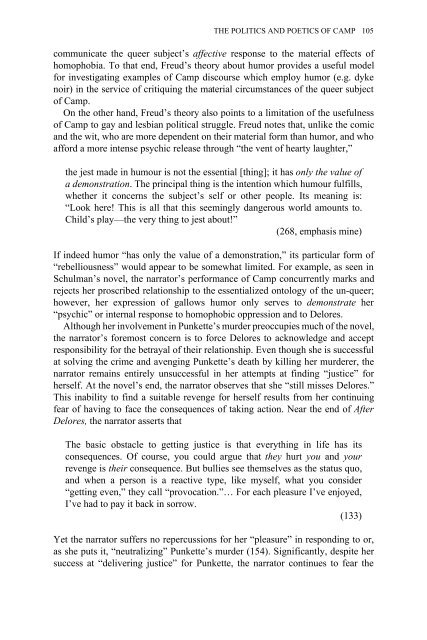Edited by Moe Meyer - Get a Free Blog
Edited by Moe Meyer - Get a Free Blog
Edited by Moe Meyer - Get a Free Blog
You also want an ePaper? Increase the reach of your titles
YUMPU automatically turns print PDFs into web optimized ePapers that Google loves.
THE POLITICS AND POETICS OF CAMP 105<br />
communicate the queer subject’s affective response to the material effects of<br />
homophobia. To that end, Freud’s theory about humor provides a useful model<br />
for investigating examples of Camp discourse which employ humor (e.g. dyke<br />
noir) in the service of critiquing the material circumstances of the queer subject<br />
of Camp.<br />
On the other hand, Freud’s theory also points to a limitation of the usefulness<br />
of Camp to gay and lesbian political struggle. Freud notes that, unlike the comic<br />
and the wit, who are more dependent on their material form than humor, and who<br />
afford a more intense psychic release through “the vent of hearty laughter,”<br />
the jest made in humour is not the essential [thing]; it has only the value of<br />
a demonstration. The principal thing is the intention which humour fulfills,<br />
whether it concerns the subject’s self or other people. Its meaning is:<br />
“Look here! This is all that this seemingly dangerous world amounts to.<br />
Child’s play—the very thing to jest about!”<br />
(268, emphasis mine)<br />
If indeed humor “has only the value of a demonstration,” its particular form of<br />
“rebelliousness” would appear to be somewhat limited. For example, as seen in<br />
Schulman’s novel, the narrator’s performance of Camp concurrently marks and<br />
rejects her proscribed relationship to the essentialized ontology of the un-queer;<br />
however, her expression of gallows humor only serves to demonstrate her<br />
“psychic” or internal response to homophobic oppression and to Delores.<br />
Although her involvement in Punkette’s murder preoccupies much of the novel,<br />
the narrator’s foremost concern is to force Delores to acknowledge and accept<br />
responsibility for the betrayal of their relationship. Even though she is successful<br />
at solving the crime and avenging Punkette’s death <strong>by</strong> killing her murderer, the<br />
narrator remains entirely unsuccessful in her attempts at finding “justice” for<br />
herself. At the novel’s end, the narrator observes that she “still misses Delores.”<br />
This inability to find a suitable revenge for herself results from her continuing<br />
fear of having to face the consequences of taking action. Near the end of After<br />
Delores, the narrator asserts that<br />
The basic obstacle to getting justice is that everything in life has its<br />
consequences. Of course, you could argue that they hurt you and your<br />
revenge is their consequence. But bullies see themselves as the status quo,<br />
and when a person is a reactive type, like myself, what you consider<br />
“getting even,” they call “provocation.”… For each pleasure I’ve enjoyed,<br />
I’ve had to pay it back in sorrow.<br />
(133)<br />
Yet the narrator suffers no repercussions for her “pleasure” in responding to or,<br />
as she puts it, “neutralizing” Punkette’s murder (154). Significantly, despite her<br />
success at “delivering justice” for Punkette, the narrator continues to fear the


